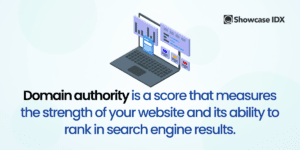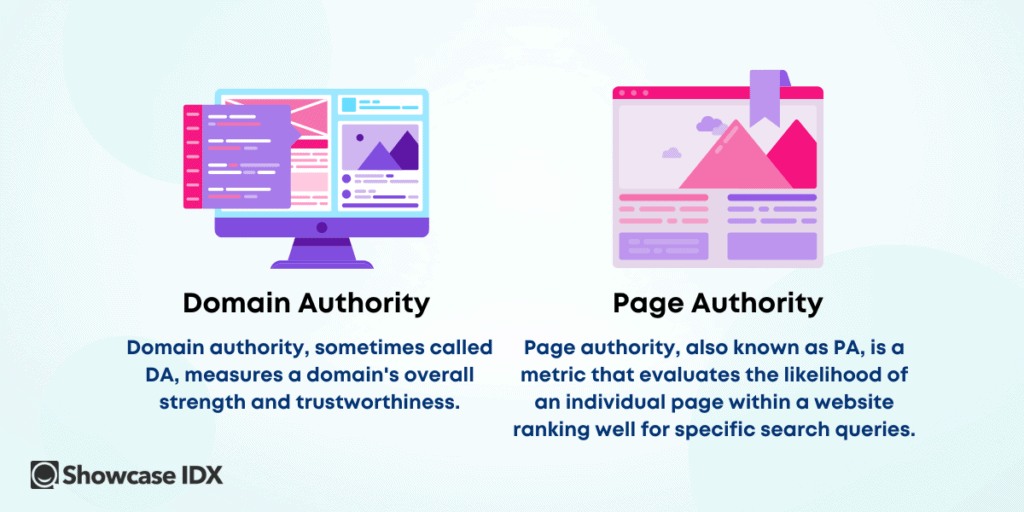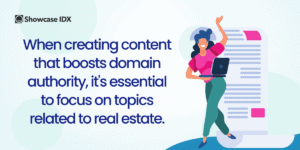As a real estate agent, your success in organic traffic mainly depends on your domain authority. So, what is the domain authority of a website? Domain authority measures the experience, expertise, authoritativeness, trustworthiness, and strength of your website’s content, which can influence how well it ranks in search engine results.
It also reflects the quality of your online presence as a professional real estate agent. Strong domain authority can be the difference between being found by potential clients or getting lost among competitors with more established websites. This article will explore why domain authority is essential for real estate agents and provide tips to help you improve yours.
What Is Domain Authority?
Domain authority is a score (on a scale from 1-100) that measures the strength of your website and its ability to rank in search engine results. The concept of domain authority was developed by Moz, a search engine optimization (SEO) software company.

This score is determined by several factors, including the quality and quantity of links pointing to your website from other websites, the type of content you’re producing, and your website’s loading speed.
How To Calculate Domain Authority (an Overview)
What is the domain authority of a site, and how do you determine it? There are several different ways to approximate your website’s domain authority score. The most common approach is using the Moz Domain Authority Tool, which gives you an understanding of how your website performs compared to other websites.
Additionally, tools like Google Analytics and Majestic SEO can help provide deeper insights into your website’s performance.
When checking your domain authority score, consider looking at the following metrics as well:
- The number of links pointing to your website from other websites
- The quality and relevance of the content on your website
- Your website’s loading speed
- The number of social shares your content is getting
- The number of active visitors to your website
By understanding the metrics that influence your domain authority score, you can create a customized long-term strategy for improving it.
Domain Authority and Google Search Rankings
While domain authority is not a direct ranking factor used by Google’s ranking algorithm, it is an essential indicator of how healthy your website is in terms of SEO. A website with a good domain authority score is generally more likely to rank higher in search engine results than one with a low score.

This is because websites with high domain authority and strong link profiles are more likely to have high-quality content and higher trustworthiness and credibility. Improving your website’s domain authority score and ranking in Google search results is essential to focus on creating quality content that is engaging and relevant to your target audience.
Factors Contributing to Domain Authority
Several factors contribute to a website’s domain authority score. Here are some of the most important ones to consider:
Quality and Quantity of Inbound Links
Links from other high-authority websites are critical in determining your domain authority score. The more high-quality links you have pointing to your website, your domain authority will be higher. That being said, it’s essential to ensure that you only earn links from reputable websites, as any links from low-quality sources can hurt your domain authority score.
Quality Content
Creating quality content is another crucial factor in improving your website’s domain authority score. Quality content should be relevant, engaging, and shareable. Additionally, it should contain critical terms related to your target audience so that they can be easily found through search engine queries.
User Experience
Another factor that can influence your domain authority is the user experience on your website. If visitors are having a difficult time navigating or accessing your content, they are likely to bounce off quickly. Improving your website’s loading speed and ensuring its user-friendly design can help keep visitors engaged.
Domain Age
The age of your domain name is also a factor in determining your website’s domain authority score. Older domains have more trust and credibility, making them more likely to rank higher in search engine results than newer domains. In addition, they tend to have more links from other websites.
Presence of Social Media Shares
Finally, sharing your compelling content on social media can help improve your domain authority score. Your website will have credibility with more shares, likes, and retweets you receive from users. Additionally, social media can help drive more organic traffic to your website, which can further improve its domain authority score.
Domain Authority vs. Page Authority

Domain authority and page authority are metrics used to approximate a website’s or domain’s quality. Domain authority, sometimes called DA, measures a domain’s overall strength and trustworthiness. It considers several factors, such as the number of backlinks pointing to the domain and social signals across different platforms.
Page authority, also known as PA, is a metric that evaluates the likelihood of an individual page within a website ranking well for specific search queries. This metric looks at various on-page elements, such as keyword density and internal linking structure, to determine how well it can rank for given keywords.
The main difference between these two metrics is that domain authority assesses the overall performance of a website, while page authority focuses more on an individual page’s performance.
How Is Domain Authority Calculated?
Domain authority gets calculated by taking an aggregated look at various factors that search engines use to rank websites. Considering these factors, it also warrants the question, “What is the domain authority of a site indicative of?” These factors include external link quality, on-page optimization, domain age, backlink profile, social influence, and keyword relevance.
These factors are weighted according to their potential impact on website rankings, and the resulting score is your Domain authority. This score can range from 0 to 100, with higher numbers indicating better overall optimization and better chances of ranking highly in search engine results.
For example, the quality of a website’s external links will be measured by looking at the ratio of good links (those from authority domains) versus bad links (those from spammy domains). If a website has more good links than bad ones, its score for this factor will improve its overall Domain Authority. However, many SEOs disagree with this aspect as they believe that Google has become smart enough to simply ignore spammy and bad links unless there is enough to indicate the potential for a manual review by Google’s team.
Similarly, on-page optimization looks for content relevancy, proper use of keywords in titles and meta descriptions, page loading time, and whether or not it is mobile friendly – each factor impacting its overall domain authority score.
How Domain Authority Affects Real Estate Agents’ Online Presence
A high domain authority benefits real estate agents because it is highly correlated to search engines’ view that the website is of sufficient quality and essential to rank well. It can help estate agents increase the visibility of their websites on search engines, leading to more qualified leads.
Higher domain authority can also lead to increased referral traffic from other websites, increased engagement with visitors, and an improved conversion rate for those who land on their website.

On the other hand, low domain authority can be detrimental to real estate agents’ online presence since it cautions that search engines may view the website as of lower quality or importance. It means the website won’t be ranked as highly and will likely get fewer organic visits from potential leads.
Low DA may also result in fewer referrals from other websites and decreased visitor engagement, leading to a lower overall conversion rate. Therefore, it’s essential for real estate agents to focus on increasing their domain authority to maximize their online presence.
How To Build Domain Authority as a Real Estate Agent
There are many strategies that real estate agents can use to build their domain authority. Here are a few of the most important ones.
Build High-Quality Inbound Links
Building high-quality inbound links is key to increasing domain authority as a real estate agent. In the simplest terms, an inbound link is a link to your website from another. It can have a significant impact on both your search engine rankings and the overall visibility of your business.
One way to build high-quality inbound links is to create content other websites want to link back to. For example, creating informative blog posts, videos, and helpful resources are great ways to attract potential partners and get them to link to you.
You can also leverage social media platforms such as Facebook, Twitter, and LinkedIn for outreach and link-building purposes, engaging with relevant discussions on industry forums or posting comments on other real estate blogs with links to your website.
Create Valuable Content
Creating valuable content is essential for building domain authority as a real estate agent. Content should be well-researched and offer unique insights into the industry. An authoritative voice lends credibility to the author, so it’s crucial to remain unbiased and provide accurate information.
From blog posts to video tutorials and e-books, there are many ways to create content that adds value to the industry. Reaching out on social media can also help build an audience and engage prospective customers.

When creating content that boosts domain authority, it’s essential to focus on topics related to real estate. This may include covering new trends in home buying or investment opportunities. Interviewing industry professionals or talking about current events can also make for interesting reading material that readers can benefit from.
In addition, being timely with your content is essential – nobody wants outdated information when making important decisions like purchasing property or investing in a home loan. Publishing regularly will ensure readers stay up-to-date on any changes in the market, as well as receive advice from trusted sources within the industry, such as yourself.
Engage With Social Media Followers
As a real estate agent, engaging with social media followers is crucial to building domain authority. By responding to posts and comments in an authentic and timely manner, agents can create meaningful connections with their audience and develop trust over time.
To further increase engagement levels and build domain authority, real estate agents should consider utilizing hashtags relevant to their audience and industry to reach more potential customers. This will not only help increase visibility but also enable agents to track conversations related to topics they care about.
Finally, it’s vital for real estate agents to remember that having an effective presence on social media isn’t just about posting content; it’s about providing value for your followers through conversation. Therefore, agents should strive to foster two-way conversations with their followers whenever possible by responding thoughtfully and promptly.
Monitor What Your Competitors Are Doing To Build Authority
Knowing and monitoring what your competitors do to build domain authority is essential as a real estate agent.
By monitoring your competition’s online presence, you can gain insight into their strategies to establish themselves as an authority in their field. Additionally, watching their content will give you ideas for topics you can cover on your website to demonstrate knowledge and expertise in this area.
By keeping tabs on the competition’s domain authority-building tactics, you can develop more effective strategies for improving your site’s visibility amongst potential customers or clients.
Spread Your Content Across Different Platforms
As a real estate agent, building domain authority by spreading your content across different platforms is crucial. Utilizing multiple channels and platforms is a great way to reach a wider audience, increase visibility, and drive more traffic to your website.

Social media outlets such as Twitter, Facebook, Instagram, Pinterest, and LinkedIn are all excellent choices for getting your content seen by more people and gaining more followers.
Likewise, videos are becoming increasingly popular for showcasing homes for sale or demonstrating how-to’s for home improvements or repairs; these can be shared on social media outlets and on YouTube for maximum exposure.
Finally, collaborations with other real estate agents (or influencers) who have already established themselves within their domain of expertise can be highly beneficial in helping you grow your brand or domain authority quicker than if you were doing it alone. Joining forces with them will give you access to their more extensive network while they benefit from yours.
Audit Your Link Profile
As a real estate agent, auditing your link profile is vital to building authority and increasing your domain authority. This process involves examining the type of websites linking to your website, their quality, relevance, and the trustworthiness of the sites they originate from. When you have more high-quality backlinks from authoritative websites pointing back to your site, your domain authority will increase.
A good audit begins by inventorying all incoming links and assessing each individually. You want to ensure that all of these authoritative backlinks come from reputable sources and are relevant to your content.
For example, if you write about home-buying advice for first-time buyers, it would be beneficial to acquire outbound links from other real estate professionals or home inspection companies that pertain to the same topic. It’s also vital for you to avoid “spammy” sites that could potentially hurt your reputation online.
Another important consideration during this process is checking for broken or expired links within the profile, which can negatively impact your ranking on SERPs (Search Engine Results Pages).
Manually finding these broken links can be tedious and time-consuming; luckily, there are tools available in the market, such as AHREFS Link Explorer or Majestic SEO, that can help speed up this process by automatically scanning through all incoming external backlinks and flagging any broken ones for review.
Create Community Pages on Your Website
One of the best ways for a real estate agent to build your domain rating and authority is by creating community pages on their website. These pages can be used to attract potential buyers and sellers looking to move into a specific neighborhood, as well as local businesses and organizations connected to the area.
Community pages can be created by providing detailed descriptions of each neighborhood or city, with listings of local schools, parks, restaurants, transportation options, and other points of interest. Agents should also include helpful links to government websites and other businesses within the area, which will help create more relevant backlinks and further improve their domain authority score.
Lastly, agents can look into offering additional services on these community pages, such as sharing tips or advice on buying or selling a home, connecting prospective buyers or sellers with qualified brokers in the area, or even offering virtual tours for prospective clients that can’t make it out in person.
Final Thoughts
Building an authoritative domain is essential for real estate agents looking to succeed with their online presence. Domain authority refers to a website’s ability to rank highly on search engine results pages and is calculated by an algorithm that considers several factors, such as the quality of incoming links, the relevance of content, and the trustworthiness of a website. To build domain authority, agents should:
- Focus on creating high-quality websites with valuable content.
- Establish links with other reputable sites.
- Optimizing their social media profiles.
Additionally, they should generate community pages on their website, which provide valuable resources to potential buyers and sellers looking to move into the area and local businesses and organizations connected to the neighborhood. These steps will help agents build a strong domain authority score and set the foundation for online success.
Now that you understand the importance of domain authority and have a few strategies to help improve it, it’s time to start taking action. Building domain authority can be a slow process, but with the right approach, you can see results quickly if done correctly.

Start by ensuring all your content is optimized for search engines and relevant to your target audience. Next, focus on building backlinks from websites and creating community pages on your website that provide valuable resources to potential buyers and sellers in the area.
Finally, don’t forget about optimizing your social media profiles – this will help increase exposure and give potential customers more ways to connect with you online. With these steps implemented into your strategy regularly, you should see an improvement in both traffic and conversions over time.
FAQs
You’re in the right place if you have additional questions about domain authority and how it can help your real estate business. Here are some of the most commonly asked questions about domain authority for real estate agents.
What is domain authority, and how does it work?
Domain authority is a score used to measure the strength of a website’s performance in search engine results pages. It gets calculated by an algorithm at Moz that considers the quality and quantity of incoming links, internal links, relevant content, and the website’s trustworthiness. The higher your score is, the better your website will, in theory, rank in search engine results pages.
What is good domain authority?
Good domain authority is generally considered to be any score over 40. Anything lower than this will likely require more effort to improve the ranking metric.
Is domain authority a real thing?
Yes, domain authority is a real thing and an essential factor to consider when optimizing your website for search engines. It can indicate your website’s visibility and ranking in search engine results pages, so it is essential to focus on building domain authority to see success with your online presence.
Why is domain authority necessary?
Domain authority is significant because it demonstrates if your website can rank higher in search engine results pages, which can result in more traffic and conversions for your real estate business. It also helps to establish trust and credibility with potential customers, which can help to increase your bottom line.
What does domain authority depend on?
Domain authority depends on the quality and quantity of incoming link juice, content relevance, and website trustworthiness. All these factors combine to create a score used by search engines to determine how your website will rank in search results.
Where can I find a website developer or SEO to help me with my website?
Many website developers and SEO companies can help you with your website. You can search online for companies in your area or look through reviews and portfolios to find one that suits your needs to improve your SEO rankings. Showcase IDX has a list of agencies to help you with your website.
Where can I find examples of great real estate websites?
You can find examples of great real estate websites on Showcase IDX. They provide a variety of portfolio websites and online marketing tools to help real estate agents showcase their property listings and increase visibility in search engine results. Additionally, they offer resources such as articles, tutorials, and webinars to help agents get started with their websites.





